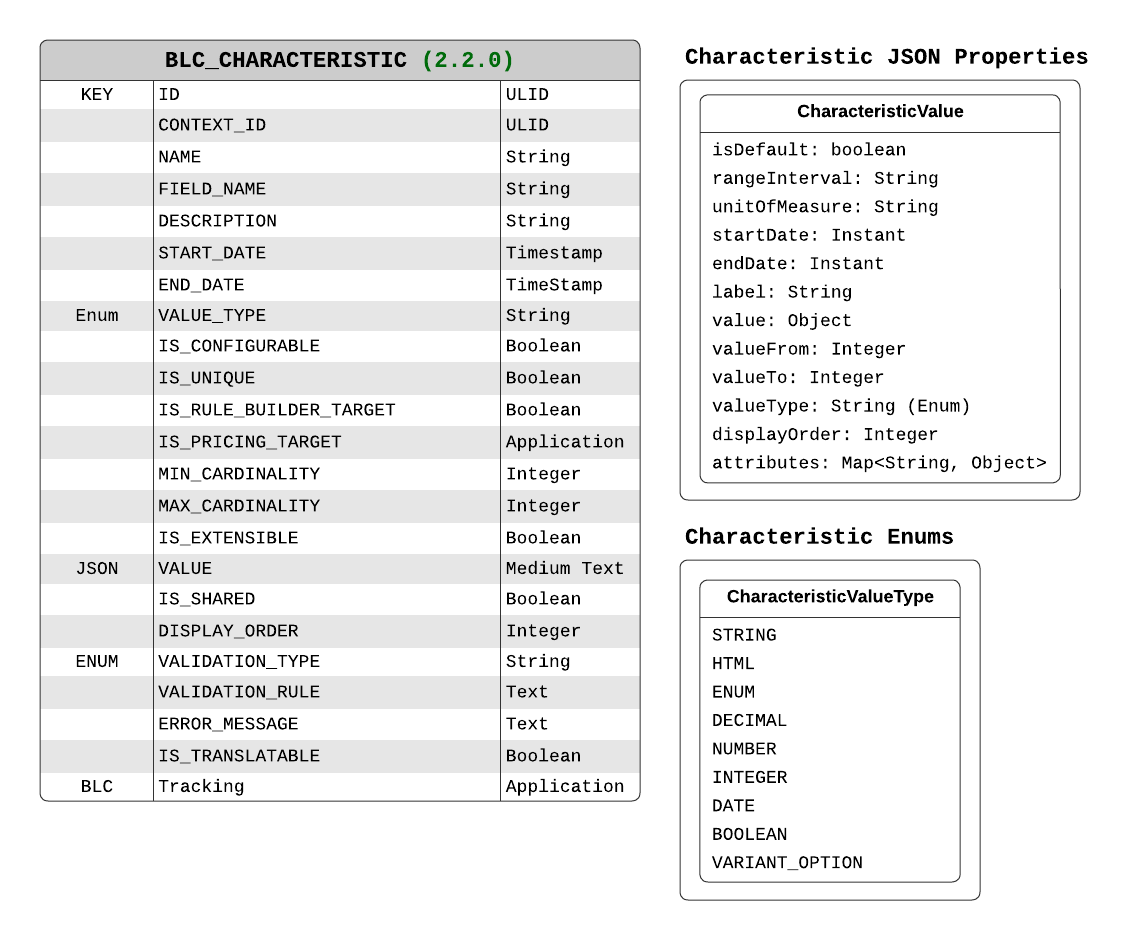
- v1.0.0-latest-prod
|
Tip
|
Introduced in Catalog Service 2.2.0 |
A Characteristic represents a property belonging to a Product Type. Characteristics define metadata regarding the property including the type of values allowed, default values to populate onto new Products when created, whether the property is configurable by customers in a shopping experience, and so on.
Characteristic values can be of several different types:
STRING
HTML
ENUM
DECIMAL
NUMBER (alias for DECIMAL)
INTEGER
DATE
BOOLEAN
VARIANT_OPTION: Indicates the Characteristic should be converted into a Variant Distinguishing Product Option on Products using the related Product Type.
The value type on the Characteristic indicates the expected field son CharacteristicValue that should be populated and limits what their valueTypes can be.
In most cases, the CharacteristicValue has to have the same valueType as its parent Characteristic.
However, ENUM and VARIANT_OPTION Characteristics have special rules.
If the Characteristic valueType is ENUM, then the CharacteristicValue can be any of the simple types: STRING, HTML, DECIMAL, NUMBER, INTEGER, DATE, or BOOLEAN.
Moreover, each CharacteristicValue has to have a label for display and each value has to have the same type—an enum’s values can’t mix strings and numbers and dates.
If the Characteristic valueType is VARIANT_OPTION, then the CharacteristicValue be a STRING and must have a label for display.
These CharacteristicValues will be converted into AttributeChoiceValues in a Product’s options.
| Field | Description |
|---|---|
|
Unique row ID. |
|
A system wide identifier. |
|
A human readable name. |
|
A transformation of the name for use as a map key. |
|
A friendly description of the Characteristic if the name is not clear enough. |
|
Date after which the entity is in use. |
|
Date until which the entity is in use. |
|
The type of value represented by this Characteristic. Default values include: |
|
Whether the value for the Characteristic is configurable by a customer in a shopping experience. |
|
Whether the value for the Characteristic must be unique. Currently unused out of box. |
|
Whether this Characteristic should be targetable in rule-builders (e.g., by Offers and Content Items). |
|
Whether this Characteristic should be targetable by pricing, e.g., a product’s price should change depending on the value of this characteristic. |
|
The minimum number of values allowed for this Characteristic on a Product. |
|
The maximum number of values allowed for this Characteristic on a Product. |
|
Whether the Characteristic can be extended. Currently unused out of box. |
|
The value(s) for this Characteristic.
In most cases this defines the default value(s) and can be overridden by Admins when creating a Product.
However, for |
|
Whether this Characteristic can be shared by multiple Product Types. |
|
The display order for this Characteristic compared to others for the same Product Type. |
|
The type of validation used for the value(s) of this Characteristic.
Values include |
|
If validation type is |
|
Message to display if the value fails validation. |
|
Whether the value(s) of the Characteristic can be translated. |
|
Application Trackable |
CharacteristicValues represent the actual values used as defaults or as the allowed values for the Characteristic when added to a Product. These can include additional information about the value such as its type, a label, display order, and so on. The Characteristic’s min and max cardinalities will determine the required number of values present on a Product.
See CharacteristicValueType for additional considerations.